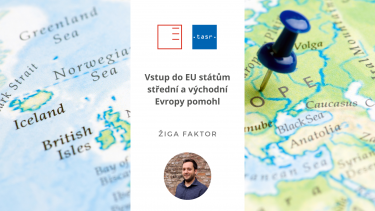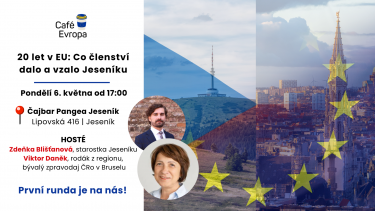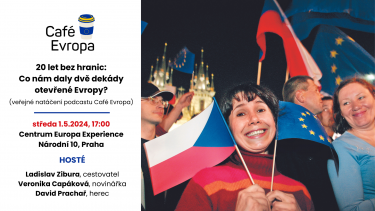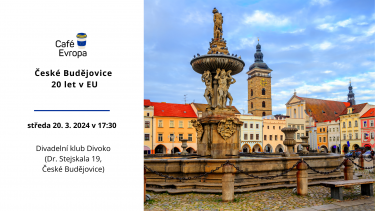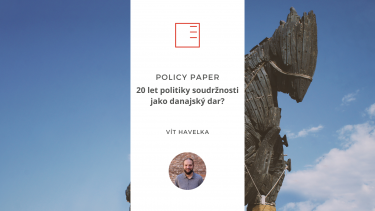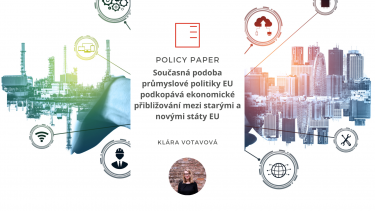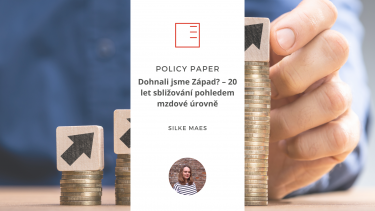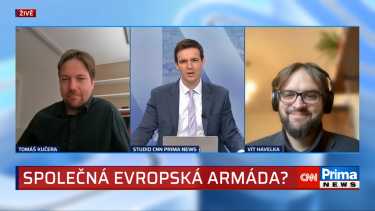TASR | EU accession helped Central and Eastern European countries
In 2004, a total of ten new countries joined the European Union, the largest enlargement in terms of population and number of countries. EU accession has helped the countries of Central and Eastern Europe, especially in terms of economic growth and political stabilisation. Žiga Faktor, Deputy Director of EUROPEUM Institute and Head of the Brussels Office, commented on this topic.
Show more
Café Evropa | 20 years in the EU: what has membership given and taken away from Jeseník?
We invite you to the next Café Evropa debate! Green Deal, migration, security, EU elections, EU subsidies... Are you interested in what's in it for Jeseník? Our guests will answer these and other questions. Come and discuss!
Show moreCafé Evropa | 20 years without borders: what have two decades of open Europe given us?
We invite you to a public recording of the Café Evropa podcast. Come and discuss twenty years of open Europe with representatives of the generation that has lived most of its life there, as well as those who remember the past regime and the waiting at the borders. What do you remember?
Show moreCafé Evropa: České Budějovice 20 years in EU
We invite you to the next debate of the Café Evropa series. Come and talk to us about what current european issues are resonating in České Budějovice and how you imagine Europe. Are you interested in nuclear energy, electromobility, euro, local projects supported by the EU, culture or any other european topics?
Show moreReport | Women in Digital Space (and AI): Looking into Central Europe: cases from Austria, Czechia, Poland and Slovakia
Our researcher Silke Maes in her latest report addresses issues of cyberviolence on women and examines whether women in the CEE benefit from digitalisation (and AI). The report looks into how women use and contribute to the digital space, examines opportunities and challenges and proposes recommendations for a more inclusive digital space.
Show morePolicy Paper | 20 years of cohesion policy as a "Beware of Greeks bearing gifts"?
It has been 20 years since the Czech Republic and 9 other Central, Southern and Eastern European countries joined the European Union. This was on the promise of increased prosperity and the so-called economic catching-up of the post-communist part of Europe. Cohesion policy was to play a key role here. Vít Havelka writes in his Policy Paper.
Show more
Policy paper | Current EU industrial policy undermines economic convergence between old and new EU countries
The post-communist states of Central and Eastern Europe, including the Czech Republic, joined the European Union at the height of globalisation and the dominance of the so-called Washington Consensus policies. However, the global economic crisis of 2008 showed shortly afterwards that these policies had their limits. Read more in Klára Votavová's Policy Pepeu.
Show morePolicy paper | Have we caught up with the West? - 20 years of convergence through the lens of wage levels
This year, the EU marks the anniversary of the biggest wave of enlargement in its history, when the Czech Republic joined the Union along with nine other Central and Eastern European countries. One of the main promises associated with enlargement was that the new Member States would catch up with Western Europe in terms of living standards. Read more in Silke Maes' policy paper.
Show moreCNN Prima News | The European Army and the position of the Defense Commissioner
The next European Commission should have a new Commissioner for Defense. There is speculation that this position could go to the Czech Republic. However, some European politicians, such as French President Emmanuel Macron, are calling directly for the creation of European army. But what are the pitfalls of the project? Vít Havelka, a research fellow at EUROPEUM Institute, talked about the usefulness and possibilities for CNN Prima News.
Show more
CNN Prima News | Two plenary session locations of the European Parliament
The MEPs discussed the difficulty of changing the seat of the European Parliament, which periodically moves from Belgium to France. Most agreed that they would welcome if this movement was canceled. However, France would probably veto such a change in the treaties. What are the arguments for and against moving the European Parliament periodically? Is there any way out of this problem, or will Strasbourg's role remain the same for decades to come? Martin Vokálek, Director of EUROPEUM Institute for European Policy, commented for CNN Prima News on the issue.
Show more
Staroměstské náměstí 4/1
Prague 1 - Staré Město
110 00
tel.: +420 212 246 552
email: europeum@europeum.org
https://www.europeum.org
